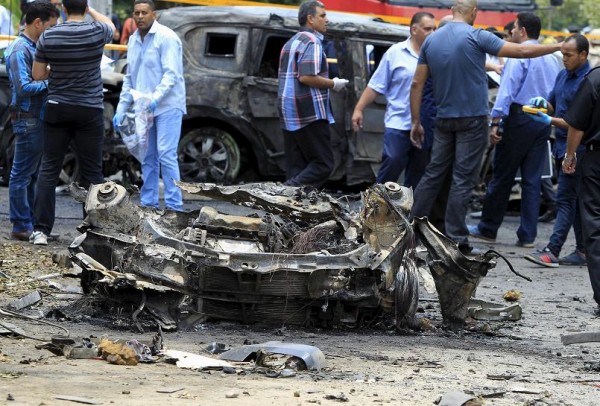
Egyptian army F-16 jets and Apache helicopters strafed the region that lies within the Sinai Peninsula, a strategic area located between Israel, the Gaza Strip and the Suez Canal.
It was the second high-profile attack in Egypt this week. On Monday, the prosecutor-general was killed in a car bombing in Cairo.
The attacks raise questions about the government’s ability to contain a Sinai-based insurgency that has already killed hundreds of police and soldiers.
Islamic State’s Egyptian affiliate, Sinai Province, claimed responsibility for the Sinai attacks in a Twitter statement.
The army said five checkpoints were attacked by about 70 militants and that soldiers had destroyed three landcruisers fitted with anti-aircraft guns. Without giving a breakdown, the army spokesman said the death toll among soldiers and attackers had increased.
The militants have previously carried out some big attacks that have killed scores of security personnel but in general they have focused on smaller-scale targets.
Wednesday’s incident, in which fighting raged for more than eight hours, marks the biggest onslaught yet.
MILITANTS PLANT BOMBS
The exact breakdown of identities of those killed was not immediately clear. Security sources said at least 36 people, including soldiers, policemen and civilians were killed and 38 militants were also killed.
The army spokesman first said 10 soldiers were killed or wounded and 22 attackers were killed. He later added that the number of deaths had increased on both sides.
Doctor Osama el-Sayed of El-Arish General Hospital in the provincial capital said 30 bodies had been brought in, “some of whom were wearing army fatigues”.
Most of the action seemed to be in the Sheikh Zuweid town.
Security sources said militants had surrounded a police station in Sheikh Zuweid and had planted bombs around it to prevent forces from leaving.
They also said the militants had planted bombs along a road between Sheikh Zuweid and an army camp to prevent the movement of any army supplies or reinforcements. The militants seized two armored vehicles, weapons and ammunition, the sources said.
Witnesses and security sources also reported hearing two explosions in the nearby town of Rafah, which borders Gaza. The sources said all roads leading to Rafah and Sheikh Zuweid were shut down and residents were staying in their homes.
The insurgency, which is seeking to topple the Cairo government has intensified since 2013, when then-army chief Abdel Fattah al-Sisi removed President Mohamed Mursi of the Muslim Brotherhood after mass protests against his rule.
Sisi, who regards the Brotherhood as a threat to national security, has since overseen a harsh crackdown on Islamists. The courts have sentenced hundreds of alleged Brotherhood supporters to death in recent months. Mursi himself, and other senior Brotherhood figures, also face the death penalty.
Sinai Province said in Wednesday’s statement that it had attacked more than 15 security sites and carried out three suicide bombings.
“It is a sharp reminder that despite the intensive counter
terrorism military campaign in the Sinai over the past 6 months, the IS ranks are not decreasing – if anything they are increasing in numbers as well as sophistication, training and daring,” Aimen Dean, a former al Qaeda insider who now runs a Gulf-based security consultancy, said in a note.
STUBBORN INSURGENCY
Islamic State had urged its followers to escalate attacks during the Islamic holy month of Ramadan which started in mid-June, though it did not specify Egypt as a target.
In late April, the army extended by three months a state of emergency imposed in parts of Sinai.
The army has taken several measures to crush the insurgency. Aside from bombardments in the region, they have destroyed tunnels into the Palestinian-ruled Gaza Strip and created a security buffer zone in northern Sinai.
The army was also digging a trench along the border with Gaza in an effort to prevent smuggling.
The measures have stoked resentment among some residents, who say they rely on the smuggling trade through the tunnels and complain of neglect by the state.
Under the terms of Egypt’s 1979 peace accord with Israel, the Sinai is largely demilitarized. But Israel has regularly agreed to Egypt bringing in reinforcements to tackle the Sinai insurgency, and one Israeli official signaled there could be further such deployments following Wednesday’s attacks.
“This incident is a game-changer,” an official told Reuters on condition of anonymity.
President Sisi said he would bring in tougher legal measures in coming days after the killing of the prosecutor, Hisham Barakat, the most senior Egyptian official to die in such an attack in years.
Sisi’s government does not distinguish between the now-outlawed Brotherhood – which says it is committed to peaceful activism – and other militants.
REUTERS

Leave a Reply
You must be logged in to post a comment.